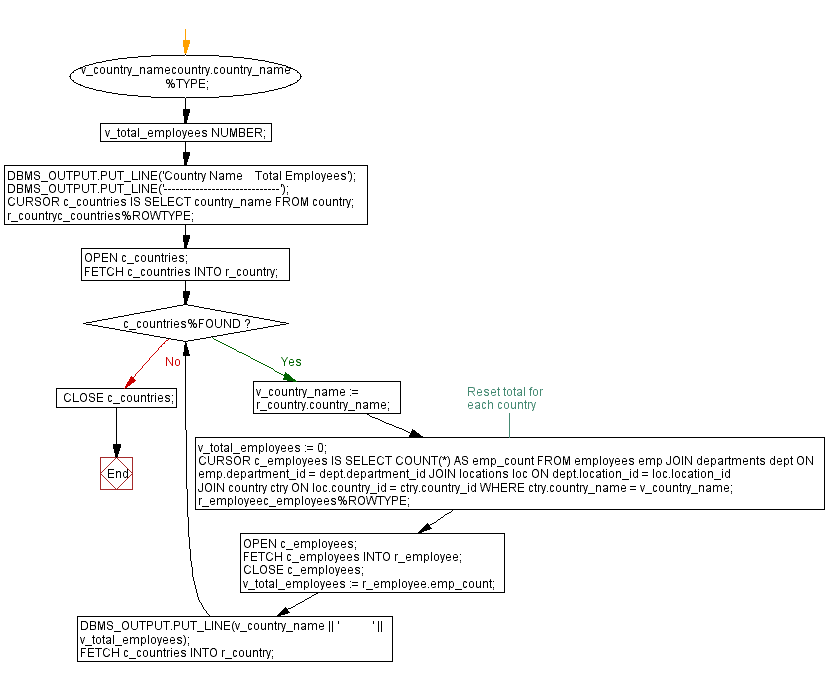Employee count by country
PL/SQL While Loop: Exercise-17 with Solution
Write a PL/SQL program to display the number of employees in each country. Return country name and number of employees
Sample Solution:
Table: employees
employee_id integer first_name varchar(25) last_name varchar(25) email archar(25) phone_number varchar(15) hire_date date job_id varchar(25) salary integer commission_pct decimal(5,2) manager_id integer department_id integer
Table: departments
department_id integer department_name varchar(25) manager_id integer location_id integerTable: country
country_id varchar(5) country_name varchar(25)Table: locations
location_id integer street_address varchar(50) postal_code varchar(13) city varchar(25) state_province varchar(25) country_id varchar(2)
PL/SQL Code:
DECLARE
v_country_namecountry.country_name%TYPE;
v_total_employees NUMBER;
BEGIN
DBMS_OUTPUT.PUT_LINE('Country Name Total Employees');
DBMS_OUTPUT.PUT_LINE('-----------------------------');
DECLARE
CURSOR c_countries IS
SELECT country_name
FROM country;
r_countryc_countries%ROWTYPE;
BEGIN
OPEN c_countries;
FETCH c_countries INTO r_country;
WHILE c_countries%FOUND LOOP
v_country_name := r_country.country_name;
v_total_employees := 0; -- Reset total for each country
DECLARE
CURSOR c_employees IS
SELECT COUNT(*) AS emp_count
FROM employees emp
JOIN departments dept ON emp.department_id = dept.department_id
JOIN locations loc ON dept.location_id = loc.location_id
JOIN country ctry ON loc.country_id = ctry.country_id
WHERE ctry.country_name = v_country_name;
r_employeec_employees%ROWTYPE;
BEGIN
OPEN c_employees;
FETCH c_employees INTO r_employee;
CLOSE c_employees;
v_total_employees := r_employee.emp_count;
END;
DBMS_OUTPUT.PUT_LINE(v_country_name || ' ' || v_total_employees);
FETCH c_countries INTO r_country;
END LOOP;
CLOSE c_countries;
END;
END;
/
Sample Output:
Country Name Total Employees ----------------------------- Argentina 0 Australia 0 Belgium 0 Brazil 0 Canada 2 Switzerland 0 China 0 Germany 1 Denmark 0 Egypt 0 France 0 Israel 0 India 0 Italy 0 Japan 0 Kuwait 0 Malaysia 0 Mexico 0 Nigeria 0 Netherlands 0 Singapore 0 United Kingdom 35 United States of America 68 Zambia 0 Zimbabwe 0
Explanation:
The said code in Oracle's PL/SQL that retrieves the employees for each country and calculates the total number of employees for each country.
The variables v_country_name that stores the current country name, and v_total_employees that stores the total employee count for each country are declared.
A cursor c_countries associated with the 'country' table record type is declared to select the country names from the 'country' table.
Inside the outer loop, the the first row is fetched from the c_countries cursor into the r_country record and the loop continues as long as there are rows found in the cursor.
The v_country_name variable is assigned the value of the current country name from the r_country record. The v_total_employees variable is then reset to 0 for each country.
Another cursor c_employees is declared that counts the employees for the current country. This cursor joins the 'employees,' 'departments,' 'locations,' and 'country' tables based on their relationships and filters the rows for the current country using the v_country_name variable.
The c_employees cursor is associated with the c_employees record type, which contains a single field emp_count to store the count of employees.
From the c_employees cursor the employee count is fetched into the r_employee record. The v_total_employees variable is updated with the value of r_employee.emp_count, representing the total number of employees for the current country.
The DBMS_OUTPUT.PUT_LINE displays the current country name and its corresponding total employee count.
The c_countries cursor is fetched again to move to the next country in the loop and the loop continues until all countries have been processed.
Flowchart:

Go to:
PREV : PL/SQL program to display total number of employees hired each year.
NEXT :PL/SQL Program to Display Average Salary for Each Department.
Improve this sample solution and post your code through Disqus
What is the difficulty level of this exercise?
